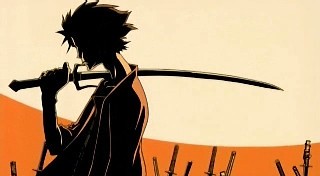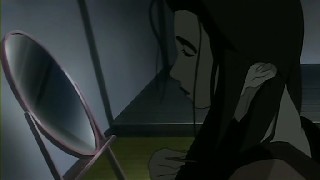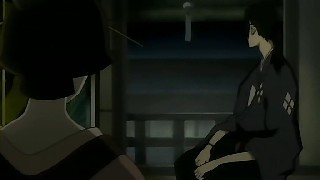Samurai Champloo: In it for the long haul...
Wow. I just watched Samurai Champloo this past weekend, and the series left an impression on me. That's not surprising, really, considering that Shinichiro Watanabe, creator and director of Cowboy Bebop, directed it. If his status as a legendary director hadn't already been guaranteed by Cowboy Bebop's success, this show would definitely have propelled him to the front ranks. But in other ways, this show is only possible because of Cowboy Bebop's performance.

Entertaining anime is easy to find. They pop up all the time, and most of the worthwhile ones make it to American shores with relative haste. However, fun anime is not easy to find - anime that makes you feel like you're a kid again playing in the park. Samurai Champloo, for all of its drama and angst sprinkled through its twenty-six episode span, is undoubtedly the "most fun anime" that I've ever watched. Even more surprisingly, the series pulls off this feat almost without even trying. Everything about it, from the funky hip-hop intro to the DJ-spinning animation excite the viewer.
Another thing, Samurai Champloo is that rare anime that the manga format cannot live up to, in any category. This fact stems from the uniqueness of how Watanabe tackles the presentation. The funky hip-hop that I mentioned earlier, so prevalent throughout the series, cannot be captured by the still-frames of manga, and the manga version of Samurai Champloo, by Masaru Gotsubo, vividly illustrates this. Samurai Champloo must be watched - not just seen, but watched.
The first episode's opening sequence highlights this beautifully. After the intro, we are treated to the most innovative series of scene shifts in the history of Japanese Animation. Like a DJ spinning a record, the scene shifts take on a rhythmic look - with visual cues to match. It has to be seen to be believed. Artistically, there are few peers to this show's creativity.
Of course, amidst all this fun and banter lie hard-hitting messages and implications concerning pressing issues in Japan. These range from America-Japan relations, to the effects of religion and corruption. Of these numerous topics, the one thing that pops out the most frequently, and hit me the hardest, was the show's portrayal of prostitution in Tokugawa Japan.
A bit of history sheds some light on a very interesting, and melancholy, subject. Prostitution became especially prevalent in Japan as people congregated towards cities - resulting in a Bakufu order that prostitution take place only on the immediate outskirts of cities. Prostitutes, once they became so, were allowed few luxuries and little freedom. They were, in effect, slaves. Attempts at escape resulted in an intense manhunt that more often than not yielded particuarly violent returns on the attempted escapee. An interesting aside: ronin were not allowed to patronize such establishments.

The episode, "Fallen Angels ~ Gambling and Gallantry," takes this concept and runs with it. Jin, the ronin, falls in love with a young woman, Shion, just about to enter one of the many prostitute houses in town. Their love is obviously impossible, and Shion's useless husband makes things no easier. In fact, Shion must become a prostitute in order to satisfy her husband's compulsive gambling habit.
What we see in "Fallen Angels," is the primary conflict of Samurai Champloo - obligation vs. desire. Shion finds herself bound by the Japanese concept of duty to many things: her husband, as well as the prostitute house in which she finds herself working. Once she meets Jin, however, a Yukio Mishima-esque conflict takes place, and she suddenly finds herself unable to choose between the desire she feels for happiness and freedom, and the obligation she feels to her husband. This climaxes when Jin asks her to come with him, to run away, and she accepts.

Shion's acceptance of her desire and freedom over the traditional value of obligation is of immense importance. In fact, such a message prevails throughout Samurai Champloo, and it's not just for show. Watanabe's message is clear - he wants himself and others to break free of the traditional bonds of servititude that Japanese society places on its people. Throughout the show, we see evidence of the harmful effects of this shame culture everywhere, from the extreme prevalence of prostitutes to the corruption of the officials in charge. Through desire and freedom, as epitomized by the youth culture with its hip-hop and style, Watanabe appears to want to change that.
Samurai Champloo excites me in a way that few anime shows have managed - and I still want more.

2 Comments:
If you like Nujabes,Fat Jon, or Force of Nature go to www.myspace.com/defnativeprequel, and listen "Twenty08" it was written to "Tsurugi No Mai" off of the "Impression" Samurai Champloo Soundtrack.
I presented this to the friend who loves this Animation.
he says really good.
http://bit.ly/ZKj2Iz
Post a Comment
<< Home